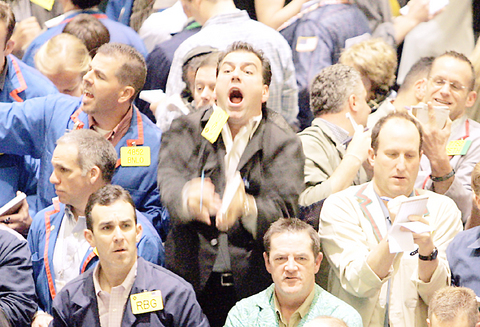World oil prices rose on Friday as the hospitalization of Saudi King Fahd unsettled markets already skittish about demand at the start of the US summer driving season.
New York's main contract, light sweet crude for delivery in July, climbed US$0.84 to US$51.85 per barrel in closing deals.
In London, the price of Brent North Sea crude oil for delivery in July gained US$0.54 to US$50.70 per barrel.

PHOTO: AP
King Fahd's hospitalization left markets nervous about events in the world's largest oil producer, which has pledged to boost production to meet surging global demand.
"Prices rose rose on short covering ahead of the week-end but then came the news that King Fahd had been brought to a hospital," which accelerated the buying, said Fimat USA analyst John Kilduff.
If Fahd were to die over the weekend, that would likely boost prices because of the "uncertainty in the major oil producer in the Middle East," he added.
Seth Kleinman of PFC Energy said the news from Saudi Arabia had an impact but "we had a strong week" for oil prices as a disappointing report on US stockpiles prompted buyers to bid up prices.
"The fundamentals have changed a lot," he said.
Prices had closed more than a dollar higher on Wednesday when a US government survey showed a surprise drop in inventory levels of crude oil, which refineries turn into gasoline.
The US summer holiday driving season, which sees many Americans taking to the open roads in their vehicles, officially begins this weekend ahead of the Memorial Day holiday.
"Some of the gains seen this week have also been in preparation for the long weekend," Investec analyst Bruce Evers said.
The US Energy Department said Wednesday that US crude inventories fell 1.6 million barrels in the latest week, against market expectations for an increase.
But at 332.4 million barrels, stocks remained well above the upper end of the average range for this time of year.
The report also showed gasoline stockpiles rising 600,000 barrels to 215.4 million, in line with most forecasts.
"With the product inventories still bearish the market may struggle to break any higher unless we see some bullish fundamental news," analysts at the Sucden brokerage firm said.
"Crude stocks are still over 10 percent above year-ago levels and OPEC looks likely to continue almost flat-out crude production."
The Organization of Petroleum Exporting Countries is producing in excess of 30 million barrels per day, a figure that is close to 25-year high points.
Tetsu Emori, chief commodities strategist at Mitsui Bussan Futures in Tokyo, said US gasoline stockpile levels were stable, allowing prices to ease below US$50 per barrel next week.
"I think there's a possibility of prices going down rather than going up," he said. "I don't think the gasoline market is tight, it's stable," he said, adding that US refineries were capable of meeting demand during the summer driving season.

SELL-OFF: Investors expect tariff-driven volatility as the local boarse reopens today, while analysts say government support and solid fundamentals would steady sentiment Local investors are bracing for a sharp market downturn today as the nation’s financial markets resume trading following a two-day closure for national holidays before the weekend, with sentiment rattled by US President Donald Trump’s sweeping tariff announcement. Trump’s unveiling of new “reciprocal tariffs” on Wednesday triggered a sell-off in global markets, with the FTSE Taiwan Index Futures — a benchmark for Taiwanese equities traded in Singapore — tumbling 9.2 percent over the past two sessions. Meanwhile, the American depositary receipts (ADRs) of Taiwan Semiconductor Manufacturing Co (TSMC, 台積電), the most heavily weighted stock on the TAIEX, plunged 13.8 percent in

A wave of stop-loss selling and panic selling hit Taiwan's stock market at its opening today, with the weighted index plunging 2,086 points — a drop of more than 9.7 percent — marking the largest intraday point and percentage loss on record. The index bottomed out at 19,212.02, while futures were locked limit-down, with more than 1,000 stocks hitting their daily drop limit. Three heavyweight stocks — Taiwan Semiconductor Manufacturing Co (TSMC, 台積電), Hon Hai Precision Industry Co (Foxconn, 鴻海精密) and MediaTek (聯發科) — hit their limit-down prices as soon as the market opened, falling to NT$848 (US$25.54), NT$138.5 and NT$1,295 respectively. TSMC's

ASML Holding NV, the sole producer of the most advanced machines used in semiconductor manufacturing, said geopolitical tensions are harming innovation a day after US President Donald Trump levied massive tariffs that promise to disrupt trade flows across the entire world. “Our industry has been built basically on the ability of people to work together, to innovate together,” ASML chief executive officer Christophe Fouquet said in a recorded message at a Thursday industry event in the Netherlands. Export controls and increasing geopolitical tensions challenge that collaboration, he said, without specifically addressing the new US tariffs. Tech executives in the EU, which is

In a small town in Paraguay, a showdown is brewing between traditional producers of yerba mate, a bitter herbal tea popular across South America, and miners of a shinier treasure: gold. A rush for the precious metal is pitting mate growers and indigenous groups against the expanding operations of small-scale miners who, until recently, were their neighbors, not nemeses. “They [the miners] have destroyed everything... The canals, springs, swamps,” said Vidal Britez, president of the Yerba Mate Producers’ Association of the town of Paso Yobai, about 210km east of capital Asuncion. “You can see the pollution from the dead fish.